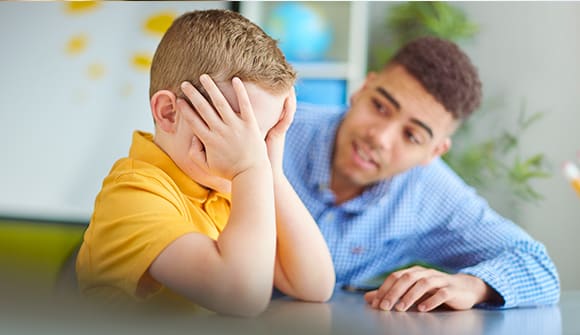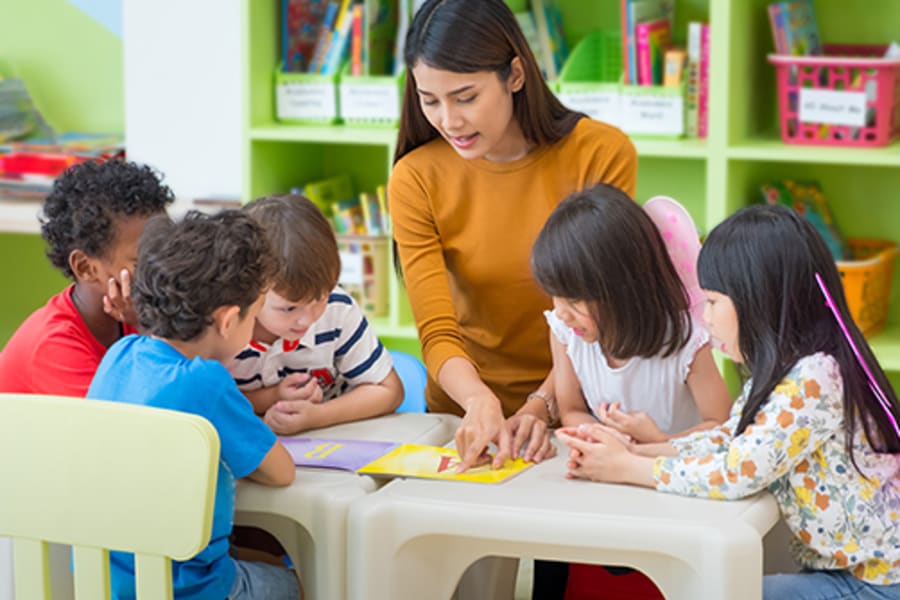Acing the school year
Challenging life events called ACEs set kids up to fail, but strong relationships can save their grades.
Article Author: Katie McPherson
Article Date:

As the school year wears on and assignments build up, extracurriculars are in full swing, and standardized testing looms, parents of students may notice their children coming home more and more frazzled. But some students are dealing with issues at home, too. And new research shows it can really affect their academics.
A recent study on adverse childhood events (ACEs), published in the journal Pediatrics, found that children who experience difficult life events tend to perform worse academically. Children exposed to four or more ACEs were more than twice as likely to repeat one or more grades at school and four times more likely to regularly skip homework than kids with no ACEs. However, researchers found that a decrease in performance didn’t happen if a parent or loved one spent time building a relationship with the child.
ACEs include experiences like parents divorcing, witnessing or being the victim of abuse, seeing mental illness or addiction in the home, and more. De'Von Patterson, PhD, a psychologist with Baptist Behavioral Health, said it’s important to know the effects ACEs can have and how to minimize them for children.
“For example, in some environments, parents may have an exposure to someone completing suicide or the homicide of a family member. If the kid didn't witness the incident directly, there are things you can do to lessen the impact of it. Part of that will be sparing them the specific details of things and giving them developmentally appropriate communication about that. Sometimes you can’t help it because the child was around it, whether it’s physical abuse or witnessing something, but in events when they don’t know about it, you can shield them in that way by not giving them imagery.”
ACEs and mental health
A child’s mental well-being is a priority after an ACE occurs, and taking care of their mind and emotions can help them manage their usual routine, including schoolwork and extracurriculars.
“If you see any behavioral changes, it’s worth taking them to a mental health clinician to evaluate how they’re doing. The clinician can give them information on their level of functioning and determine whether they would benefit from treatment,” said Dr. Patterson. “Even if I have someone who will not be continuing treatment, I can explain to parents, ‘If you see this or that happen, come back because I want to know about it.’ There’s no reason to be overly hesitant about seeking out mental health services. It’s OK to go before you’re absolutely sure your child needs them.”
The best way to ensure your child, or a child in your family, can handle the ACEs in their life is to strengthen your relationship as much as possible. Positive relationships are considered a protective factor, or something that can offset the potential damage of ACEs. Other protective factors the study identified include:
- Living in a safe neighborhood
- Having family dinners
- Regular conversations between parents and kids
- A smoke-free household
“How parents develop a connection with their kids is going to be really important," said Dr. Patterson. "An issue I see often is parents being very reactive to things their kids tell them. If a kiddo wants to share something with a parent and the adult has a big reaction, a negative reaction or yells at them, that teaches the child how the parent will respond to other things in the future, right or wrong. If they always give them a big reaction, they’ll be reluctant to share things.
"I work with parents a lot on being able to hear their child and talk about their expectations for them without the big reactivity," he added. "Part of that is going to be parents managing their own emotions. If the kiddo feels they can bring things to you, that can serve as an important source."
Engaging with your child
Dr. Patterson said parents should always try to connect with their children emotionally, even about things that may seem like no big deal to an adult.
“Taking the time to engage with your child on something he or she is excited about is a gesture that signals, ‘Hey, this person cares about what I care about, and they’ll listen if I bring something to them.’ When you’re having those conversations with teens and preteens, don’t be dismissive of the things they’re talking about. This is a common thing I see with parents where, if they’re upset about a friend who did something to them or a boyfriend who broke up with them, the parent dismisses it with, ‘You won’t even know this person in 10 years and it won’t matter.’ It makes them feel like you don’t understand them or what they’re trying to share with you. If you’ve been dismissive in the past, it’s a fair assumption for them to think you’ll do that going forward.”
Dr. Patterson said you don’t have to be a child’s parent, or know anything about their life events, to be a protective factor for them. In fact, many children find these relationships in extended family and teachers, too.
“Give children an outlet to talk with you about things. If you can become someone they believe they can share things with, being able to connect with you is going to be helpful,” he explained. “I’ve seen it repeatedly where a kiddo is in a horrible situation but they have an adult at home, in the family or in school they believe cares about them, and it’s an incredible resource for them to reduce symptoms and make them feel connected. Parents, encourage the development of those relationships. Encourage extracurriculars where they can find that in their peers and other adult figures, like coaches.”
If your child is struggling with school or experiencing an adverse childhood event, call 904.376.3800 to connect with a pediatric behavioral health provider who can help. Visit wwolfsonchildrens.com to learn more.



